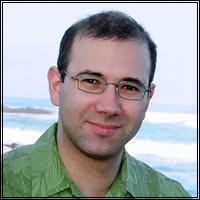| ISCB 2010 Overton Prize: Steven E. Brenner

|
Picture: 2010 Overton Prize Winner,
Steven E. Brenner,
photo by Glen Dohie |
By BJ Morrison McKay, ISCB Executive Officer
and Clare Sansom, Bioinformatics Consultant and Science Writer
Each year ISCB honors a young scientist who has already achieved a significant and lasting impact on our field. The ISCB Awards Committee, comprised of current and former directors of the society and chaired by Søren Brunak, announced the recipient of the 2010 ISCB Overton Prize is Steven E. Brenner of the University of California, Berkeley, USA. Brenner will be presented with his award at ISMB 2010 in Boston, where he will give the opening keynote lecture on July 11th.
Brenner chose the flexibility of Biochemical Sciences for his undergraduate studies at Harvard, and followed his advisor’s encouragement to take computer science courses as well. As an undergraduate, he was able to work in Walter Gilbert’s lab, “maybe the very first genome lab in the world.” Gilbert and his colleagues were sequencing the genome of the bacterium Mycoplasma genitalium. While in Gilbert’s lab, Brenner met colleagues who introduced him to the idea of combining both his interests into the study of computational biology.
After graduation, Brenner obtained a fellowship for graduate study at the University of Cambridge, and studied for his PhD in the MRC Laboratory of Molecular Biology under Cyrus Chothia. As one of the original authors of the SCOP: Structural Classification of Proteins database, Brenner presented it at the second ISMB meeting in 1994. While initially having an uncertain reception, SCOP has since been cited over 4,000 times and remains widely used today.
After leaving Cambridge, Brenner obtained a fellowship to the National Institute of Bioscience, Japan, to work on genome analysis, but he was soon back in the US as a postdoctoral research fellow in Michael Levitt’s lab at Stanford University. In Levitt’s lab, he continued to work on genome and protein sequence analysis and the detection of distant evolutionary relationships between proteins.
In 2000, Brenner moved to the University of California, Berkeley, as an assistant professor, and became a faculty scientist at Lawrence Berkeley National Laboratory that same year. In 2009 he was appointed as an adjunct professor at the University of California, San Francisco, and is promoted to full professorship at UC Berkeley this year. His lab now includes experimental as well as computational biologists.
Over time, Brenner’s research interests have broadened away from protein structure. In the decade since obtaining his first independent position, he has contributed to the understanding of genomes, and to protein and RNA function. All of his work, however, can be characterized as using evolutionary principles and statistical and computational methods to understand biology. His most important contribution to the RNA field was the discovery of the prevalence of RNA surveillance and alternative splicing as a novel mode of gene regulation. He continues to work in this area and has extended his work in RNA regulation as a member of the modENCODE consortium, which aims to identify all the functional sequence elements in the Drosophila and Caenorhabditis elegans genomes. His recent research in protein function prediction picks up on scientific interests he first discovered as an undergraduate researcher at Harvard: his group’s prediction algorithms are amongst the most accurate available. He has also been involved in establishing computational approaches for the field of structural genomics, and has developed an interest in relating human genetic variation to phenotype and disease. He set out his “vision for personal genome interpretation” in a short paper in Nature in 2007, and for the last few years he has been advancing that vision for translational genomics.
Brunak recognizes that Brenner is at the upper end of the seniority bracket for the Overton Prize. “Young scientists who achieve a conspicuous success like SCOP very early in their career too often ‘burn out.’ In contrast, Brenner is a worthy winner because of the long-standing, excellent track record that he has established in research and scholarship,” he says. Brenner himself is quick to attribute much of this success to his “wonderful” mentors, collaborators, colleagues—and especially the postdocs and students in his group from whom he says he learned the most science. He cites inspirations ranging from his parents, to advisors Gilbert, Chothia, and Levitt, who taught him “how to do science at a high level,” to his senior colleague at Berkeley, Jasper Rine. This readiness to share the credit for his achievements further underscores his worthiness as the recipient of the 2010 ISCB Overton Prize.
This article is excerpted from the June 2010 issue of PLoS Computational Biology. To link to the full journal article please visit www.ploscompbiol.org/doi/pcbi.1000831.
 |


